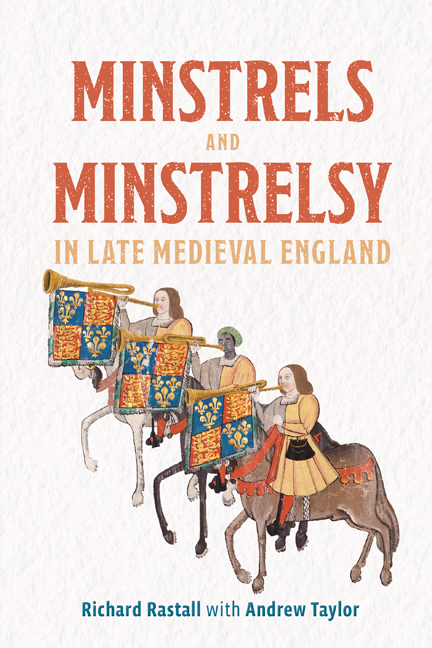Book contents
- Frontmatter
- Dedication
- Contents
- List of illustrations
- List of music examples
- List of abbreviations
- A note on references
- A note on money
- A note on dates
- Preface
- Acknowledgments
- Part I Minstrels and Minstrelsy in the Elite Households
- Part II Urban Minstrelsy
- Part III On the Road
- Part IV Minstrel Performance
- Envoi
- Bibliography
- Index
10 - The regulation and protection of minstrels
Published online by Cambridge University Press: 09 January 2024
- Frontmatter
- Dedication
- Contents
- List of illustrations
- List of music examples
- List of abbreviations
- A note on references
- A note on money
- A note on dates
- Preface
- Acknowledgments
- Part I Minstrels and Minstrelsy in the Elite Households
- Part II Urban Minstrelsy
- Part III On the Road
- Part IV Minstrel Performance
- Envoi
- Bibliography
- Index
Summary
It has been a common view that itinerant minstrels were at the lowest level of society, reviled as immoral and criminal, cast out by the Church and severely circumscribed by the secular and civic authorities. Writers on minstrelsy in Germany, England and France have held this view, citing examples from various places throughout the late Middle Ages to show minstrels committing crimes, supporting immorality, and being excluded and punished by ecclesiastical and secular authority. As John Southworth expressed it,1
It is not just that the [social] status of the minstrel was low; for very many of his contemporaries, he was altogether beyond the pale of social acceptance. … Not only was he excluded … from the normal web of ties and responsibilities that constituted medieval society, but even his membership of the universal church, the fellowship of baptised Christians, was at one time in serious dispute.
This is a view that I have accepted in the past, but is it really justified? Does enough evidence exist to demonstrate the case for itinerant minstrels being abhorred as ‘beyond the pale’? On further reflection, perhaps not.
The Church was certainly suspicious of those who performed music that resulted in sensual enjoyment and might encourage illicit sexual behaviour and other immorality. It is hardly surprising that the Church as an institution should play safe by taking a conservative view, recognising the potential dangers to the Christian soul and acting accordingly. Civic authorities, too, were wary of an itinerant trade that could cause disturbance of various kinds, such as loud noises at night, drunken brawls in ale houses, and enjoyable distraction while pickpockets and other thieves were at work. But there is also much to be said on the other side. As noted in Chapter 5, individual clerics were more practical in their approach to minstrelsy, enjoying the entertainment of minstrels on appropriate occasions and extending to them the hospitality that was part of the Church's charitable obligation. The heads of secular households took the same course; and towns saw no harm in minstrelsy per se, only a need to exercise crime prevention and administer punishment when necessary.
- Type
- Chapter
- Information
- Minstrels and Minstrelsy in Late Medieval England , pp. 198 - 226Publisher: Boydell & BrewerPrint publication year: 2023

